“During the pandemic, much of our attention has been centered around supply. The lower number of launches in the last two years compared to pre-pandemic years shows the sacrifices made in terms of new product innovation,” says Erika Gayhart, associate marketing manager-food cultures and enzymes at Chr. Hansen Inc., who will speak on “Global and Micro Trends Shaping Innovation in Cultured Dairy” on March 29th at the International Dairy Foods Association’s Yogurt & Cultured Innovation Conference. “As we draw closer to the eventual end of this era, more companies will resume launching new innovative products. Now is a great time to consider what your next product will be. At Chr. Hansen, we have been paying close attention to consumer and processor behaviors, gathering insights from all over the world. In this talk, we will be looking at some of the global trends we’ve identified that may draw inspiration for your own brand.”
For more information on the conference, link HERE.
As prices go up in the supermarket, it is critical to remind consumers that dairy foods are one of the most affordable sources of nutrition, in particular, high-quality, complete protein, which is the type of protein the human body craves and requires to function at its best. The cultured dairy products category encompasses foods that are concentrated sources of protein and other dairy nutrients. It includes yogurt, cottage cheese, sour cream, cream cheese, dips and a few other novel fermented dairy foods.
Most of these dairy foods are simple formulations, yet made by complex and meticulous processes. It is possible to make all of them with U.S.-sourced ingredients, often times local ingredients. This helps keep prices down and is also good for the economy and the planet. These facts need to be communicated to consumers.
So how does a marketer differentiate to ensure their brand gets noticed on the retail shelf?
For starters, no- or low-added sugars are paramount, and even a not-so-sweet taste profile has become the norm among younger consumers who prefer beverages such as flavored, unsweetened seltzers over the overtly sweet (from sugar or non-nutritive sweeteners) sodas that older consumers grew up with.
Consumers today also want added value. This can come in the form of milk source (e.g., grass-fed, A2, regenerative organic, etc.) It also may come from international recipes and global flavors.
Probiotics, prebiotics and their impact on immunity keep cultured dairy products relevant to today’s health and wellness consumers. Limited-batch recipes are also attractive, as they create an urgency to purchase and try before the concept is sold out. Partnering with a celebrity spokesperson also appears to be the biggest trend across all food and beverage. Dairy included.
Let’s explore some recent innovations that address these trends.
Premium yogurt producer Tims Dairy and Wilkin & Sons have collaborated on a limited-edition strawberry Greek yogurt in the U.K. The British brands partnered on this new offering to celebrate the Platinum Jubilee of Elizabeth II. The Greek-style strawberry yogurt uses Wilkin & Sons’ preserves brand, Tiptree’s. It is a strawberry jam with champagne conserve. Tims Dairy yogurts are made with live active cultures, fresh British milk and all-natural ingredients. The single-serve container was only available for one month.
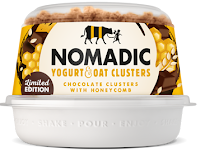
Nomadic Dairy has introduced a limited-edition Honeycomb & Chocolate variant to its four-strong Yogurt & Oat Cluster lineup. The offering is part of a rolling program of limited-edition flavors throughout the year by the Irish brand.
“Our Yogurt & Clusters range has been a runaway success for years now, but our market research recently found that customers wanted to see new flavors,” says Bethan Miles, brand manager at Nomadic Dairy. “It therefore made sense to create this deliciously indulgent limited edition, especially given the high demand for such flavors across all food categories.”

Back in the U.S. and with international flair, DAH! has been busy. The company manufactures premium, slow-cultured dairy and plant-based yogurts that merge the time-tested, ancient wisdom of India’s culinary traditions with the precision of modern methods and technologies. DAH! recently announced a new partnership with Indian-American author, TV host, producer and culinary expert Padma Lakshmi. Lakshmi has joined the company as a board advisor and brand partner. In this position, she will work hand-in-hand with the executive team and board of directors to advise on the overall direction of the company, brand equity and innovation strategy, and lend her expertise to the research and development department to help craft and test new products and flavors.
The newest flavor in the company’s lassi line is Tomato with Mixed Berries. Lassi is a slow-cultured yogurt smoothie cooked at a lower temperature for a more extended time yielding a smooth, richly textured, intensely flavorful product. It is made with whole milk and real fruit and is packed with 15 billion probiotics per serving.
Good Culture, a clean-label, cultured foods brand credited with revolutionizing cottage cheese, is teaming up with celebrity fitness trainer, fitness influencer and founder of The Sculpt Society—Megan Roup—to engage health-conscious consumers and help them experience how good cultured foods can make them feel. The company’s humanely and sustainably sourced milk that goes into its cottage cheese provides high protein and gut-friendly live and active cultures.
“Protein and live and active cultures help build energy, muscle, gut health and good feelings, all things my community cares about,” says Roup. “Good Culture is a delicious and sensible indulgence with unparalleled taste and thick and creamy texture, but what it does for your body is what makes it a real star. When you eat good food, you feel good."
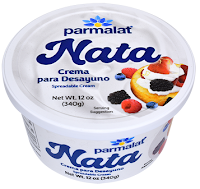
Late last year, Karoun Dairies, part of the Parmalat family, rolled out Nata Crema para Desayuno (Nata Breakfast Cream), which is a naturally sweet clotted cream made with real California whole milk. Popular in Mexico and Latin America, the spread can be used on toast topped with honey, put a spoonful on fruit, or mix it into a dessert.
The company is also rolling out a new range of premium dips, also under the Parmalat label. The Jocoque Seco concept is said to be a healthier alternative to dips, mayonnaise, cream and cream cheese. This product will be featured next week as a Daily Dose of Dairy.
Kemps, a business of Dairy Farmers of America, continues to grow its single-serve cottage line with the addition of Bacon Cheddar and Bacon Ranch.
“It’s part of a campaign to drive excitement in cottage cheese through new flavors,” says Rachel Kyllo, senior vice president of marketing and innovation.
Danone North America has expanded its Dannon Light + Fit yogurt range in collaboration with the women’s nonprofit, Dress for Success Worldwide. The new Greek nonfat yogurt comes in Lemon Cream and Orange Cream flavors. The new Light + Fit yogurts contain 12 grams of protein, 7 grams of total sugar, 0 grams of fat and are a good source of calcium. Each flavor has 80 calories per 5.3-ounce serving. They come in four packs with a suggested retail price of $3.99.
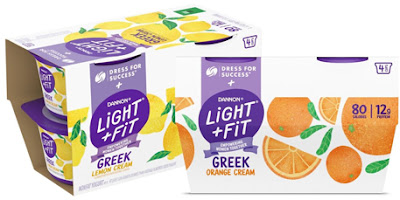
The company also recognizes that there has been an increasing focus on the importance of supporting the immune system, particularly due to its relationship with overall wellbeing. Younger generations, like Millennials, are looking for functional benefits in their foods. Activia, the probiotic pioneer and modern gut health innovator, has launched its latest innovation to meet that growing demand. The new Activia+ Multi-Benefit Probiotic Yogurt Drinks are packed with billions of live and active probiotics that help support gut health, plus are an excellent source (20% Daily Value) of vitamins C, D and zinc to support the immune system. Activia+ is available in 3.1-fluir-ounce bottles. Six packs sell for about $4.59.
“At Danone, we know good gut health is the gateway to a variety of health benefits and overall well-being,” says Kallie Goodwin, vice president of family and wellness brands at Danone North America. “We also know that consumers are becoming increasingly interested in both gut health and foods that help support the immune system. Our new innovation, Activia+, comes at the perfect time as, now more than ever, people are turning to functional foods and products for the extra support of their gut and immune system.”

40 Years Later, FDA Tells the Dairy Industry and Consumers to Keep Waiting for Yogurt Rules
On March 22, 2022, the U.S. Food and Drug Administration published a notice to clarify that the effectiveness of certain provisions of the yogurt standard of identity final rule have been stayed. The final rule, published on June 11, 2021, amended the standard of identity for yogurt and revoked the definitions and standards of identity for low-fat yogurt and nonfat yogurt. Dairy standards of identity are subject to formal rulemaking procedures, which provide a 30-day period for any person adversely affected to file an objection and request for hearing. If objections are properly filed, then the provisions to which objections were made do not go into effect (i.e., are “stayed’). Because FDA received objections to certain provisions of the final rule within this timeframe, the affected provisions are stayed pending final FDA action on the objections.
“Yogurt makers have been waiting 40 years for the FDA to update and modernize the yogurt standard of identity,” says Michael Dykes, president and CEO of the International Dairy Foods Association. “The FDA is telling us to keep waiting, and threw in a whole lot of uncertainty, to boot.”
Last July, IDFA forcefully objected to FDA’s final rule to amend and modernize the standard of identity for yogurt. In December, IDFA sent a letter to the acting commissioner for FDA reiterating a request for a hearing with FDA to resolve the industry’s objections, along with providing manufacturers sufficient time for compliance.
“After eight months of waiting, FDA issued a notice staying certain provisions of the yogurt standard of identity final rule,” says Dykes. “IDFA was able to leverage unique formal rulemaking procedures available to the dairy industry to object and, ultimately, prompt a stay of certain provisions that are detrimental to our industry. Without this lever, an impractical final rule would have gone into effect, damaging yogurt makers, throwing retail establishments into confusion and limiting choice for consumers. While a stay is helpful at this stage, IDFA’s efforts to reform the yogurt standard of identity will continue into an inexplicable fifth decade.”
Here's additional background on the FDA notice that was published in the Federal Register:
1. Stayed Provisions: FDA is staying all provisions to which objections were filed.
2.
Effects of Stays: However, because the 1981 yogurt standard of identity final rule remains in effect, the stays themselves do not necessarily allow yogurt to be formulated in a way consistent with IDFA’s proposed modifications to the rules. Specifically, consistent with the 1981 rule:
- Cream may not be added after culturing (if added, it must be included in the culturing process).
- The overall 3.25% minimum milkfat requirement remains in effect.
- Ultrafiltered milk may not be used as a basic dairy ingredient (though it may be used as an optional dairy ingredient).
- For titratable acidity (TA), there is currently no requirement in effect. This is because the 1981 rule established a TA requirement, but it was stayed after an objection was filed in 1982. The 2021 rule established a different TA requirement, but this too has now been stayed.
3.
Enforcement Discretion: FDA has exercised enforcement discretion to allow the following, consistent with IDFA’s requests: (1) addition of vitamin D at a level of 10% DV per RACC; (2) addition of non-nutritive sweeteners (without requiring a nutrient content claim); and (3) addition of bulky flavoring ingredients (e.g., coconut) that increase the total fat level above 3 grams per RACC, as long as milkfat is 3 grams or less per RACC and the product is labeled to reflect the addition of the flavor (e.g., “low fat yogurt with coconut”). The enforcement discretion is in effect until FDA decides if a hearing is justified and issues a notice accordingly.
4. Hearing: FDA has not yet determined whether it will grant a hearing or make any modifications to the final rule.
5. Compliance Date: FDA does not comment on the compliance date timeline once final determinations have been made on the stayed provisions. The non-stayed provisions in the 2021 final rule remain in effect and the compliance date is still Jan. 1, 2024.
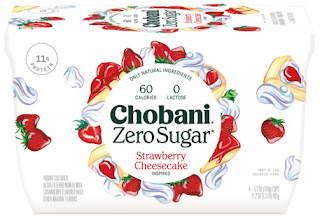


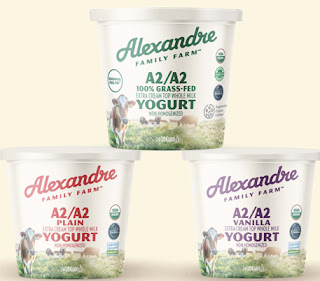





.png)




No comments:
Post a Comment